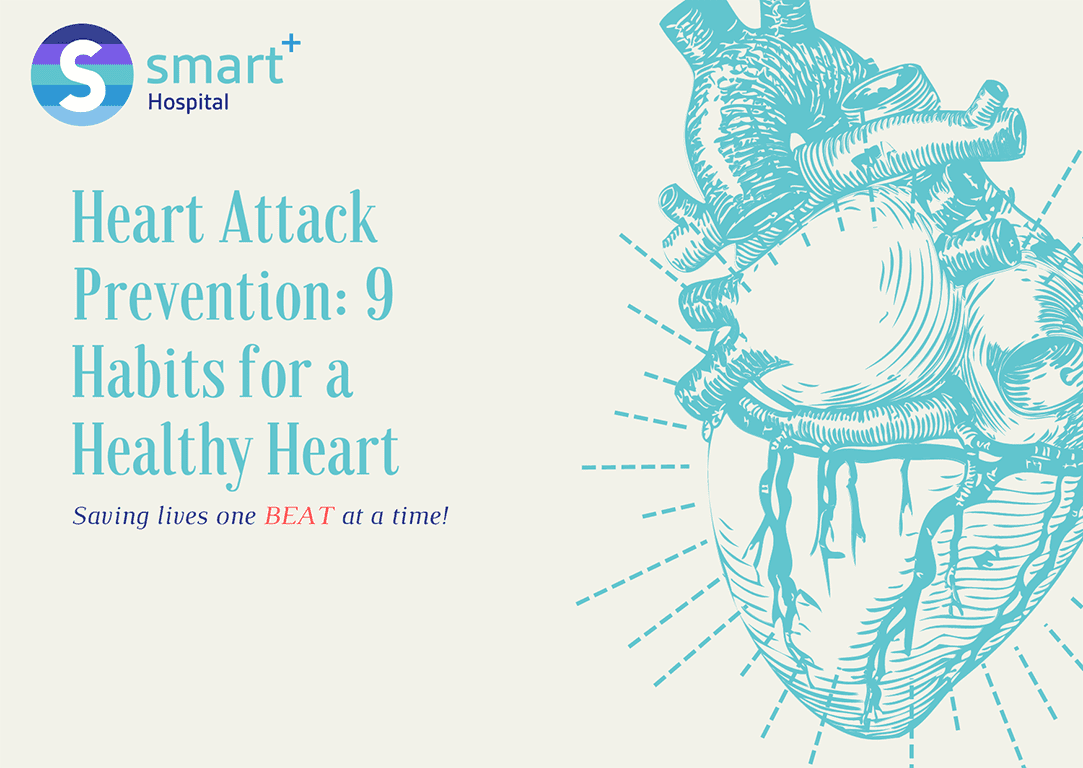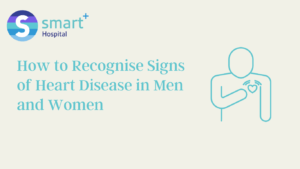Heart attacks are a common symptom of heart disease in Pakistan and worldwide. However, the good news is that heart attacks are preventable significantly by adopting healthy habits and making lifestyle changes.
In this blog, we’ll explore 9 habits that can help you reduce your risk of heart attack and improve your overall heart health.
1: Maintaining a Heart-Healthy Diet
Maintaining a heart-healthy diet is one of the most essential habits for preventing heart disease. The food you eat impacts your heart health, and a diet rich in fruits, vegetables, whole grains, lean protein, and healthy fats and low in salt, added sugars, and unhealthy fats can help reduce the risk of heart disease and heart attack.
To make dietary changes:
- Incorporate more fruits and vegetables into your meals
- Choose whole grain options instead of refined grains
- Opt for lean protein sources such as chicken, fish, and beans
- Limit your intake of unhealthy fats, such as saturated and trans fats
- Reduce your intake of salt
- These simple changes can have a significant impact on your heart health.
2: Engaging in Regular Physical Activity
Physical activity is essential for maintaining heart health. It helps to lower blood pressure, improve cholesterol levels, and reduce stress, all of which can reduce the risk of heart attack. The American Heart Association recommends at least 150 minutes of moderate-intensity aerobic activity or 75 minutes of vigorous-intensity aerobic activity per week.
Incorporating physical activity into your daily routine can be as simple as taking a brisk walk, running, or taking a yoga class. Find an activity that you enjoy, and aim to make it a part of your daily routine. Regular physical activity is critical to preventing heart disease and heart attack.
3: Managing Stress
Stress can significantly impact heart health, increasing the risk of heart attack and other heart-related conditions. Finding healthy ways to cope with stress is imperative, such as exercise, meditation, and deep breathing exercises.
Reducing stress in your daily life can be as simple as taking a few minutes each day to relax, engaging in activities you enjoy, or spending time with loved ones. Avoiding stressful situations as much as possible and finding healthy ways to cope with stress can help reduce stress’s impact on your heart health.
4: Quit Smoking
Smoking is a leading cause of heart disease and heart attack. Quitting smoking can significantly reduce the risk of heart attack and improve heart health.
To quit smoking, consider seeking the help of a healthcare provider, using nicotine replacement therapy, or participating in a smoking cessation program. Surround yourself with support from friends and loved ones, and stay motivated by reminding yourself of the benefits of quitting smoking for your heart health. Quitting smoking is one of the most essential habits for preventing heart disease and heart attack.
5: Monitoring and Managing Blood Pressure
High blood pressure is also a significant risk factor for heart disease and heart attack. Monitoring and managing blood pressure can help to reduce the risk of heart attack and improve heart health.
It is vital to monitor and manage blood pressure by visiting a healthcare provider regularly and making lifestyle changes to help control it, such as eating a healthy diet, exercising, and managing stress. A healthcare provider may prescribe medication to help control blood pressure if necessary. Monitoring and managing your blood pressure is crucial for preventing heart disease and heart attacks.
6: Managing Cholesterol Levels
High cholesterol levels can increase the risk of heart disease and heart attack. Maintaining cholesterol levels requires a heart-healthy diet, physical activity, and avoiding unhealthy fats.
In addition to lifestyle changes, your healthcare provider may also prescribe medication to help control cholesterol levels. Regularly monitoring and managing cholesterol levels can help reduce the risk of heart disease and heart attack. Keeping cholesterol levels in check is a vital habit for maintaining heart health.
7: Maintaining a Healthy Body Weight
Being overweight or obese can increase the risk of heart disease and heart attack. Maintaining a healthy body weight can help to reduce the risk of heart attack and improve heart health.
To maintain a healthy body weight, eating a healthy diet, engaging in regular physical activity, and limiting calorie-dense and high-fat foods are essential. Keep track of your weight, and work with a healthcare provider to develop a plan for reaching and maintaining a healthy body weight. Maintaining a healthy body weight prevents heart disease and heart attack.
8: Getting Enough Sleep
Getting enough sleep is vital for maintaining heart health. Lack of sleep can increase the risk of heart disease and heart attack.
The National Sleep Foundation recommends adults get 7-9 hours of sleep per night. To get enough sleep, establish a bedtime routine, create a sleep-conducive environment, and avoid screens before bedtime. If you’re having trouble sleeping, talk to a healthcare provider who can help identify and treat any underlying sleep disorders. Getting enough sleep is vital for preventing heart disease and heart attack.
9: Seeking Regular Medical Care
Regular medical care should be prioritised for maintaining heart health. During regular doctor visits, your healthcare provider can monitor your heart health, check your blood pressure and cholesterol levels, and make any necessary lifestyle or medication changes.
In addition to regular doctor visits, keeping track of your heart health at home, monitoring your blood pressure and cholesterol levels, and making lifestyle changes as necessary are important. By seeking regular medical care and monitoring your heart health, you can reduce your risk of heart attack and improve your overall health. Seeking regular medical care is a critical habit for maintaining heart health.
Final Takeaway
Heart disease and cardiac arrest are serious health issues affecting millions globally, including Pakistan. However, the good news is that heart attacks are preventable by adopting healthy habits and making lifestyle changes.
Remember, making these lifestyle changes may take time, but the benefits to your heart health are worth the effort. Start incorporating these habits into your daily routine and take control of your heart health.





Pingback: Cardiac Rehab: Phases and Exercises to Help Your Heart - DWH